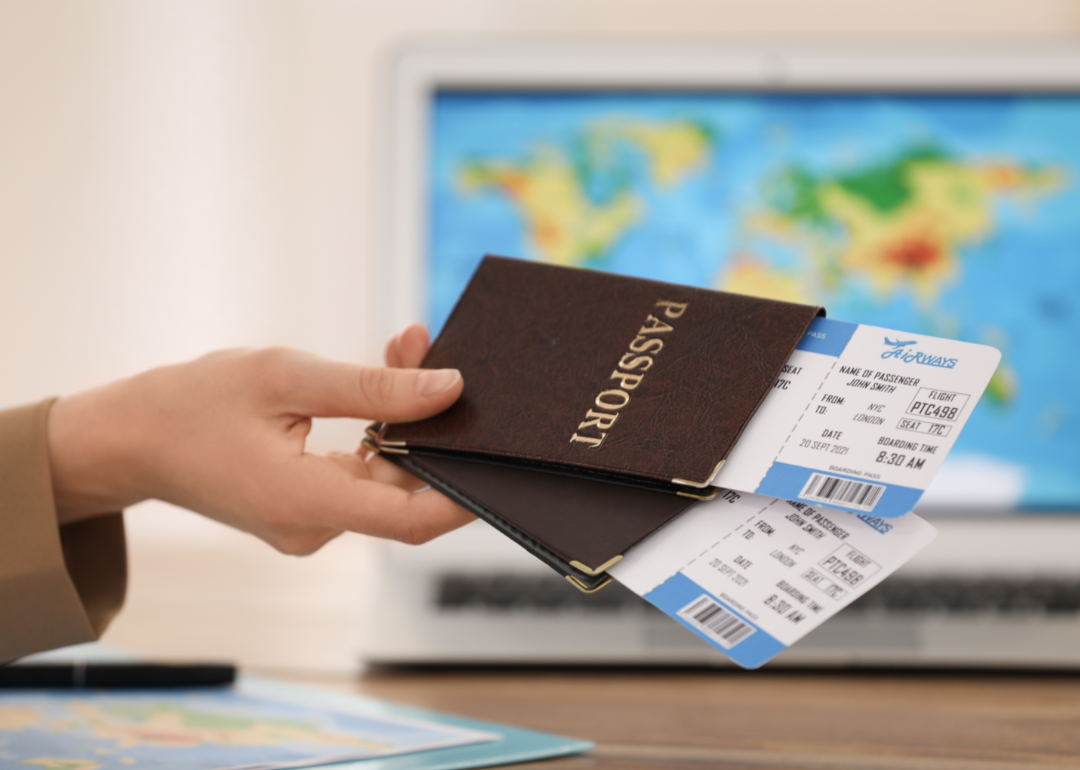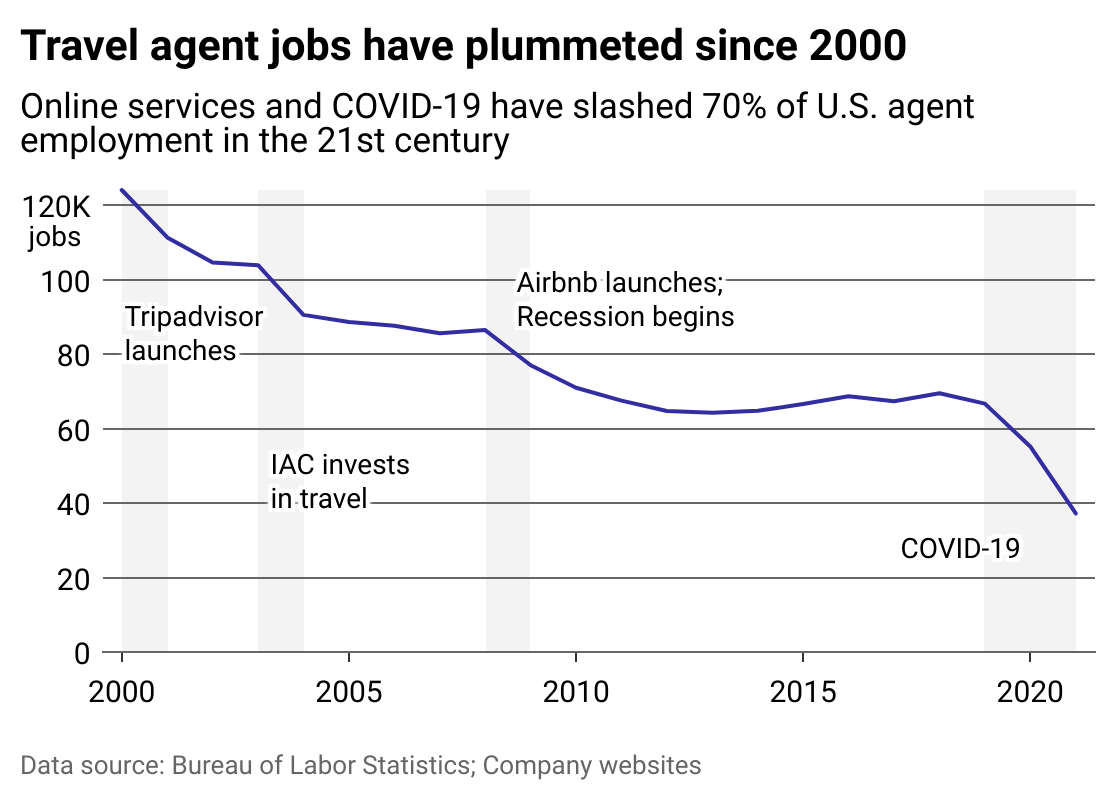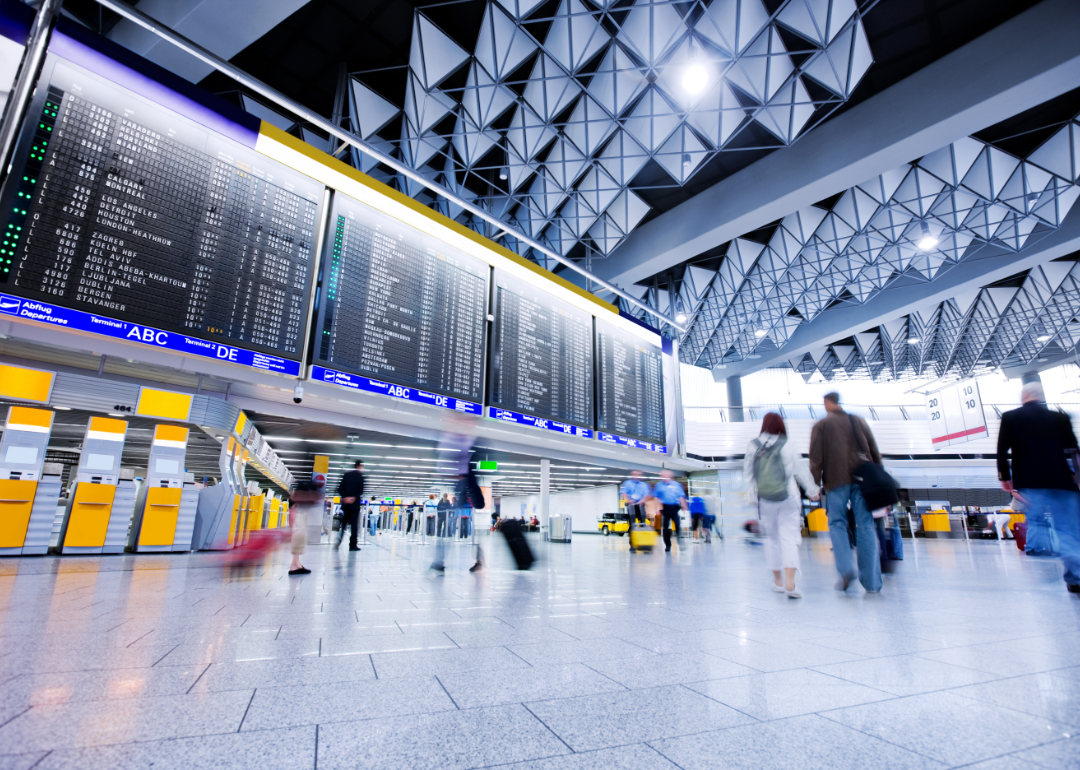
How online booking has changed the travel agent landscape
This story originally appeared on TravelPerk and was produced and distributed in partnership with Stacker Studio.
How online booking has changed the travel agent landscape
Travel agent jobs have dipped sharply, dropping about 70% between 2000 and 2021, according to the Bureau of Labor Statistics. The proliferation of online travel companies has made it easy for deal hunters, armchair travelers, and business travel planners to track information and find the best deals at their fingertips. But don't count out travel agents yet—many are seeing a resurgence as travel recovers from the COVID-19 pandemic.
TravelPerk used BLS data to analyze the decline in U.S. employment of travel agents over time, comparing employment to a timeline of online travel resources that have propelled online booking.
It's important to note the differences between various booking option services available to customers. Travel agents help clients in planning their trips by arranging travel with suppliers. Examples of their suppliers include package tours, travel insurance, railways, cruise lines, car rentals, airlines, hotels, and so on. A travel agent's clients include corporations, groups, or individuals, who often have very different travel needs and expectations. Business travelers, for example, are spending 50% less on travel than pre-pandemic, but as they steadily return, many have concerns including mitigating costs as in-person conferences restart and anticipating changing entry restrictions, especially for international travel. Leisure travelers may turn to agents to recommend lower-risk—but still scenic—vacation destinations.
Travel agents can own their business or work for an agency owned by someone else. Instead of working with travelers on an itinerary from the ground up, a tour operator, in contrast, will arrange specific packages with suppliers such as airlines and hotels. They will then offer these packages to their customers. Booking sites, on the other hand, make it possible for travelers tailor-fit their travel arrangements and book them on their own, whether it's just a short weekend jaunt or a month-long international business trip.
Travel is forecast to return closer to pre-pandemic levels in 2023—the U.S. Travel Association projects that next year leisure spending will return to 2019 levels and business travel will climb to 88% of 2019 spending. Read on to learn more about how these online booking sites have changed the travel agent landscape.

Travel agent jobs experience a drastic decline
The internet has significantly impacted travel—fundamentally transforming the experience itself and upending the way the industry functions. As traditional operators struggled to adapt, new brands began to emerge. The industry's digital disruption started in the '90s and has continued steadily.
In 1994, Travelweb.com, the first comprehensive worldwide hotel properties catalog online, appeared. It would soon include a feature allowing customers to make online bookings. Then, in 1995, the Internet Travel Network claimed to oversee the first online airline reservation. ITN was the forerunner of GetThere, the reservation system for corporate travel.
In 2000, it sold to Sabre, which ran an automated airline seat reservation system. Also in 1995, Viator Systems—now known as Viator—started a travel technology business that helped provide bookings for excursions and destination tours online.
In 1996, a new player entered the online travel bookings world: Expedia. This online platform was Microsoft's foray into online travel. This attempt has been incredibly successful, given its spot as one of the world's top online travel agencies. At a time before e-commerece was widely adopted, Expedia gave consumers price comparisons for flights, car, and hotels—and the means to easily and safely book them on the site. The website's first advertisement touted that everyday people could now use "the same reservation system" as travel agents.
That same year, partly inspired by the U.S. airline Southwest, Ryanair introduced its famously low-cost airline model, transforming Europe's airline industry by allowing travelers to book directly on airline websites. Bypassing travel agents and online booking platforms cuts out service fees and commissions, and also allows users to pick any flight the airline offered—not just the ones selected by a third party.
Other players that emerged in the '90s include Lastminute.com, Travelocity, FareChase, and Priceline. FareChase used metasearch, working as a search engine that gathered fares from booking websites for hotels, airlines, and agencies. This platform laid the groundwork for other online booking solutions like Skyscanner, TravelSupermarket, Kayak, and Sidestep, which operated as one-stop-shops to find deals across different airline and company websites.
In that same decade, information about travel destinations became more accessible to consumers. In 1995, Jeff Greenwald became the first travel blogger when he published a travel article for Global Network Navigator. While travel blogging isn't the same as making online bookings, it also makes a difference in the travel agent landscape. As information proliferates online about travel how-tos and destinations, more and more people are inspired to plan trips and make travel decisions—including booking and ticketing—rather than relying on the expertise of a travel agent.

The 2000s further accelerated changes in the travel industry
Tripadvisor was founded in 2000 and had a mission to help people make better travel decisions. The company organized hotel listings, making them more searchable, and ranked hotels based on travelers' reviews. With this information at their fingertips, prospective travelers could book using the recommendations of other travelers instead of a travel agent.
After Sept. 11, it took nearly three years for airline travel to return to previous levels after a high of 65.4 million passengers in August 2001. As the travel industry dealt with the downturn in business and leisure trips, these online platforms became the saving grace for operators like hotels and airlines who needed to sell large amounts of available inventory. The travel industry's reliance on these platforms remains to this day.
Another shift came in 2003 when IAC purchased Expedia. IAC's constellation of websites, led by Barry Diller, attracts up to 2 billion monthly visits in 190 countries. In the first quarter of 2003, Expedia's net income quadrupled to $26.9 million with a revenue of $198.8 million, signaling a further rift between travel agents and their customers, who are now planning their trips online.
Even though Priceline launched in 1997, it wasn't until 2004 that its popularity surged with the acquisition of Active Hotels, a European online hotel reservation service. The following year, Priceline also bought Booking.com, cementing its share of the profitable European travel market. Also in 2004, the online home-sharing platform CouchSurfing was launched, offering travelers the opportunity to stay and experience their chosen destination with locals.
Not long after, the travel industry saw a startup poised to change the hotel industry fundamentally. AirBedAndBreakfast—now named Airbnb—was able to secure significant funding in 2009, after which they experienced growth so quickly that, by 2011, users had booked 1 million nights on the platform, which was then available in 89 countries.
During the global financial crisis of 2008, airline stocks plummeted 68%, and cruise lines, hotels, and resorts fell 74%. The following 10 years tested travel industry systems, and those that survived became more agile and accessible, especially for those in developing nations. Before the 2008 recession, China, India, and Latin America made up 21% of international travel. By 2016, that share had almost doubled to 41%.

COVID-19's impact has been predictably significant
In 2021, the number of international arrivals was 1 billion less than before the pandemic. World Tourism Organization experts believe the travel industry will not fully recover until at least 2024. Worldwide spending on tourism and travel was less than half in 2020 than what it had been in 2019. Employment was also heavily impacted, with 62 million people working in the worldwide tourism and travel sector losing their jobs in 2020.
Despite the gloom and doom of the pandemic, it looks like some recovery might be on the horizon for travel agents. The BLS projects a 20% increase in demand for travel agents from 2021 to 2031, outstripping its 5% growth projection for all occupations.
Some have reported a marked recovery in business, even compared to pre-pandemic levels. A flash poll conducted by the American Society of Travel Advisors in early March 2021 revealed that in 2021, 76% of travel advisers saw an increase in customers versus pre-pandemic times, and 80% have fielded queries from those who had never used a travel adviser before.
Because of the constant changes in restrictions and rules, travelers began reaching out to travel agents who could help them plan their trips. More travelers have looked to travel agents who can help when business trips, cruises, and other plans are canceled or delayed due to health restrictions. As more agents become more adept at dealing with last-minute travel support assistance, their roles may expand beyond just planning for trips to also helping more with crisis management and recovery for travelers.
As travel surges back to life, so may the fortunes of travel agents rise along with it.



